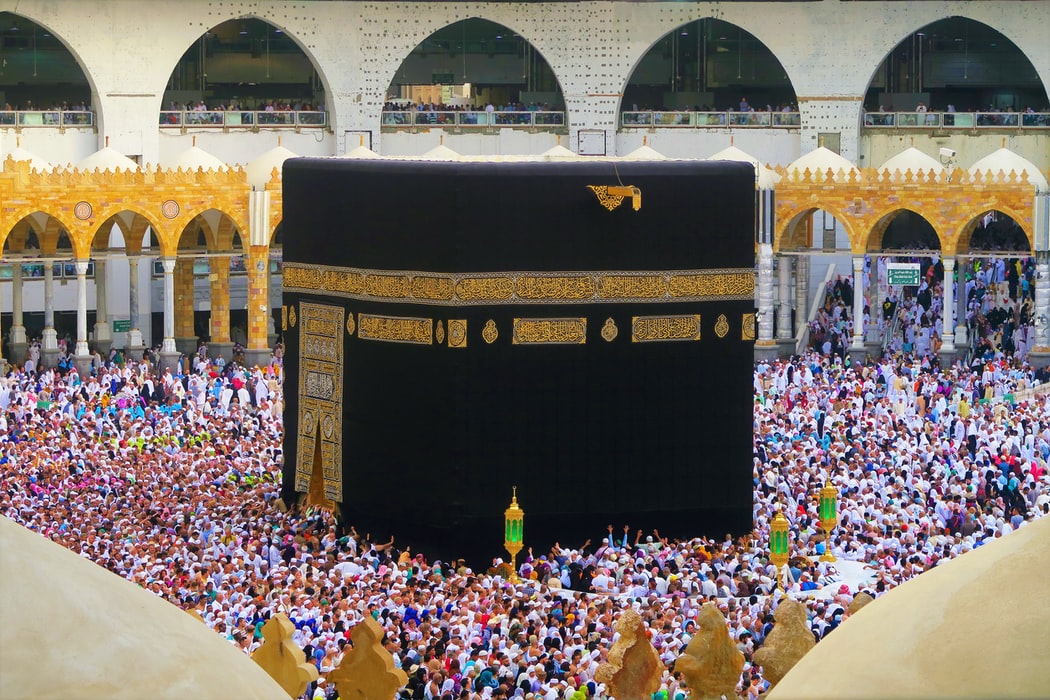|
Both of these were answered by Prophet Muhammad ﷺ when two men approached him on two different occasions. Imaan A prophetic hadith informs us that: One day while Allah's Messenger ﷺ was sitting with the people, a man came to him walking and said, "O Allah's Messenger ﷺ what is Imaan (Faith)?" Allah’s Messenger ﷺ said, "Faith is to believe in Allah, His Angels, His Books, His Apostles (Messengers), and the meeting with Him, and to believe in the Resurrection."[1] In another narration, he also added “…and that you believe in qadr (divine decree or predestination) in its entire entirety.”[2] The Quran also confirms these articles as part of Islamic faith: “The Messenger has believed in what was revealed to him from his Lord, and [so have] the believers. All of them have believed in Allah and His angels and His books and His messengers, [saying], "We make no distinction between any of His messengers.”[3] Islam In a prophetic hadith we are informed : A man from Najd with unkempt hair came to Allah’s Messenger ﷺ and we heard his loud voice but could not understand what he was saying, until he came near and then we came to know that he was asking about Islam. Allah’s Messenger ﷺ said, “You have to offer prayers perfectly 5 times in a day and night (twenty-four hours).” The man asked, “Is there any more (praying)?” Allah’s Messenger ﷺ replied, “No, but if you want to do voluntary (nawafil) prayers (you can).” Allah’s Messenger ﷺ further said to him: “You have to observe fasts during the month of Ramadan.” The man asked, “Is there any more fasting?” Allah’s Messenger ﷺ replied, “No, but if you want to observe the voluntary (nawafil) fasts (you can).” Then Allah’s Messenger ﷺ further said to him, “You have to pay the zakat (obligatory charity).” The man asked, “Is there anything other than the zakat for me to pay?” Allah’s Messenger ﷺ replied, “No, unless you want to give additional charity of your own.” And then that man retreated saying, “By God! I will neither do less nor more than this.” Allah’s Messenger ﷺ said, “If what he said is true, then he will be successful (i.e. he will be granted Paradise)”.[4] In another hadith the Prophet kept it short but added all five pillars: “al-Islam is raised on five (pillars), testifying (the fact) that there is no god but Allah, that Muhammad is His servant and messenger, and the establishment of salah (5 times prayer), payment of zakat (obligatory charity), pilgrimage (hajj & umrah) to the house (kaabah) and the fast of ramadan.”[5] Brief overview All five actions called the five pillars of Islam as taught in hadith and mentioned in the Quran, constitute as deen[6] (way of life) of Islam. The seven articles of faith mentioned in the Quran and the hadith constitute as what we call Imaan (faith) and majority of Islamic scholars accept this view. Various topics related to faith such as Allah ﷻ and His existence, His attributes and communication with us, Islamic concept of worship, angels and jinns (invisible beings), Day of Judgment, prophethood and revelation, are all further discussed in this website. References: [1] Sahih Bukhari - Book 2, Hadith 43 [2] Sahih Muslim – Hadith 10 [3] Al Quran 2:285 [4] Sahih Al-Bukhari, Kitab Al-Iman, Hadith no. 44 [5] Sahih Muslim Hadith 16 [6] The Arabic term deen means ‘way of life’ usually translated as 'religion'.
0 Comments
 Islam and Salaam are Arabic words coming from the root word s-l-m, which means ‘to be safe and secure’. Islam is usually translated in English as ‘submission’ and Salaam is translated as ‘peace’. Therefore, the understanding that, whoever acts in submission to the will of Allah ﷻ is going to attain peace. However, the English term ‘submission’ is not adequate translation especially when needing to understand in the context of how Islam is defined in the Quran. The wider meaning of Islam should be ‘self-submission’. The reason for translating it by including the word ‘self’ is that submission of your will to Allah’s will can never be under any form of duress, it can only be done if it comes from within your own self i.e. wholeheartedly. This is supported by the fact in the Quran where Allah ﷻ has made it very clear: (Al Quran 2:256) Let there be no compulsion in matters of faith. Therefore, the correct English translation for Islam should be ‘self-submission’ especially when being understood in the context of the Quran. Muhammad Asad adopted this translation of Islam throughout his Quran commentary Message of the Quran. The following is one of the verses from his translation: (Al Quran 3:19) Behold, the only [true] religion in the sight of God is [man's] self-surrender to Him (Islam). References: [1] Al Quran 2:256 – Asad Translation. [2] Al Quran 3:19 - Asad Translation.  Wholehearted submission to Allah's will It is said in the Quran that the only religion in the sight of Allah ﷻ is Islam defined as "self-surrender" or "self-submission". As per Quran the purpose of humankind’s temporary existence on earth is to know the will of Allah ﷻ, which He revealed through His chosen ones called the Prophets and Messengers, and after knowing, submit to it willingly and wholeheartedly: (Al Quran 3:85) For, if one goes in search of a religion other than self-surrender (Islam) to God, it will never be accepted from him, and in the life to come he shall be among the lost. In Islam every word has a relation to its meaning and no word is meaningless. Islam means "self-submission" which is related to the word salaam which means "peace", and the term muslim means "the one who submits their will to Allah's will". The purpose of religion is to willingly submit to guidance delivered by Allah ﷻ, attain peace in this world and be successful in the hereafter, which is our destination. Hence the term Islam informs us about our purpose of religion and our existence on earth as opposed to terms like Judaism or Christianity or Buddhism or Hinduism. For instance Judaism is a term referring to a set of teachings followed by the people who belonged to Kingdom of Judah. This term was coined by people and Israeli Prophets like Musa (Moses) (alaihi salaam) never referred to his teachings as such. Neither is the term Christianity coming from Isa ibn Maryam (Jesus son of Mary) (alaihim us salaam), a term coined by his followers quite a long while after him. Similarly, a citizen of land of Hind or “ancient India” is called a Hindu, hence Hinduism is a reference to the religious teachings followed by the people of that land. Therefore, it is quite easy to conclude that terms like Judaism or Buddhism (a term referred to teachings of a man named Buddha) are man-made, they are often found related to a land or a person, and their meaning is confined to the religious teachings of an ethnicity or a region. However, this is not the case in message of the Quran. Its message is universal and encompasses the entire humankind. The Quran reminds followers of previous prophets that their purpose was also to submit wholeheartedly to the teachings brought to them by those great prophets. But after those Prophets passed away, their followers changed their teachings due to mutual discords and formed in to numerous sects and coined new terms for their religion: (Al Quran 3:19) Behold, the only [true] religion in the sight of God is [man's] self-surrender to Him (Islam); and those who were given revelation aforetime took, out of mutual jealousy, to divergent views [on this point] only after knowledge had come to them.[2] This resulted in them significantly losing the purpose of religion. Thus it would be correct to say that since Islam is universally defined as “submitting one’s will to Allah’s will” then it is the only true religion and way of life in the sight of Allah ﷻ from the time of Adam (a.s) till now and will remain till the end of the world. References: [1] Al Quran 3:85 – Asad Translation [2] Al Quran 3:19 – Asad Translation |
AuthorZaid Shaw Archives
February 2021
Categories |
Proudly powered by Weebly

 RSS Feed
RSS Feed